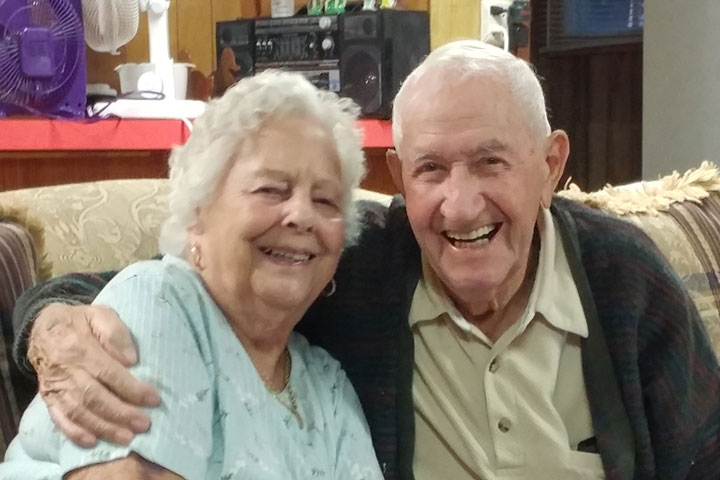Wendy Schofield knew her father Victor didn’t have too much time left, in late October 2018. The 93-year-old had taken a bad turn over the Thanksgiving weekend, waking up unable to walk and rapidly losing his memory and function to dementia.

She knew he wanted to die at home – being stuck in a nursing home or hospital was one of his biggest worries, she said – so the family did their best.
“I promised him, as long as I was able, we would keep him at home and take care of him,” Schofield said.
But one weekend, he was clearly having issues. “That Saturday before he died, he got so restless that we decided we were going to have to take him to the hospital to get some medication. Nothing we were doing was keeping him comfortable.”
So, she called 911, telling them that it was an end-of-life care situation.
The paramedics who showed up at their door were able to offer more than just a ride to the hospital. Trained under a special palliative care program in Nova Scotia, they provided Victor with medication to soothe him and even came back several times over the weekend to give more help.
“Thank heavens for those two — Trent and Jenny. I can’t say enough about them,” Schofield said.
- Budget 2024: Liberals look to offset drug plan cost with higher smoking, vaping taxes
- Landmark smoking ban that would phase out sales passes U.K. parliament
- ‘Bacterial vampirism’: Deadly pathogens attracted to human blood, study finds
- Health task force blasted over ‘dangerous guidance’ for cancer screenings
Nova Scotia paramedics have provided some limited palliative-care services, like medication to help with pain or shortness of breath, review of the care plan and counselling for the family, since 2015. Similar programs exist in P.E.I. and Alberta.
Now, other provinces are jumping on board. The Canadian Foundation for Health Care Improvement and the Canadian Partnership Against Cancer are funding local programs in six new provinces to enable paramedics to deliver palliative care services. They’re hoping to train 5,000 paramedics by 2022.
Participating areas include:
- BC Emergency Health Services
- Saskatchewan Health Authority Regina Area
- Interlake-Eastern Regional Health Authority (Manitoba)
- York Region Paramedic Services (Ontario)
- Ottawa Hospital Research Institute
- New Brunswick Department of Health
- Eastern Health (Newfoundland and Labrador)
This program provides extra options, said Dartmouth paramedic Katherine Houde, beyond what paramedics could do before — which was nothing, or take the patient to the hospital.
“A lot of these patients require really high doses of narcotics or different treatments that we wouldn’t have been allowed to just treat them and leave them at home.”
WATCH: Few Canadians have early access to home palliative care: study

Hospitals can present problems, she said. Palliative-care patients would typically be lower-priority cases in an emergency room, so could be waiting hours in a hallway before they’re seen. Then, they may not have a private room or family might not be as free to visit as they would like.
Having the option to receive care at home can avoid that discomfort. “It’s really just bringing quality of life to people at a time in their life when they might not get that in a hospital. And giving them some dignity too. They’re not being left to lie in a hallway for hours trying to get needs met.”
Houde, who estimates she answers about one palliative-care call every month, finds them the most rewarding part of her job. “It’s probably my favourite kind of call because I feel like it’s where I make the most global difference.”
Paramedics are well-suited to take on this extra work, said Dr. Alix Carter, who oversaw the implementation of the palliative-care program in Nova Scotia and P.E.I.
“There’s really no other service that’s available 24 hours a day, seven days a week, that can be at your house within 10 or 15 minutes,” she said.
The program has had a huge impact, she thinks. “It’s amazing to see. We’ve heard the difference that it’s made to families here and to the teams and most importantly to the patients and their families.”
“The first call that we heard, the family called us after to let us know there had been a very peaceful home death and that’s exactly what they had wanted. And it brought tears to our eyes.”
Victor Schofield died in his Nova Scotia home on Oct. 29, 2018, after two or three days of getting palliative care from paramedics. Wendy thinks it’s exactly what he would have wanted.
“We were with him. So he didn’t die alone. He was surrounded by us and his dog (…) And he was in his own pyjamas in his own bed.”
Palliative care is wonderful if it’s done right, she said. “It gives you the option to stay in your own home and to have death with dignity. You’re not just a number, or a room number, or a disease.”
“You’re still your person. And you’re still with your family. And I think that’s what it comes down to: you’re not dying alone.”




Comments